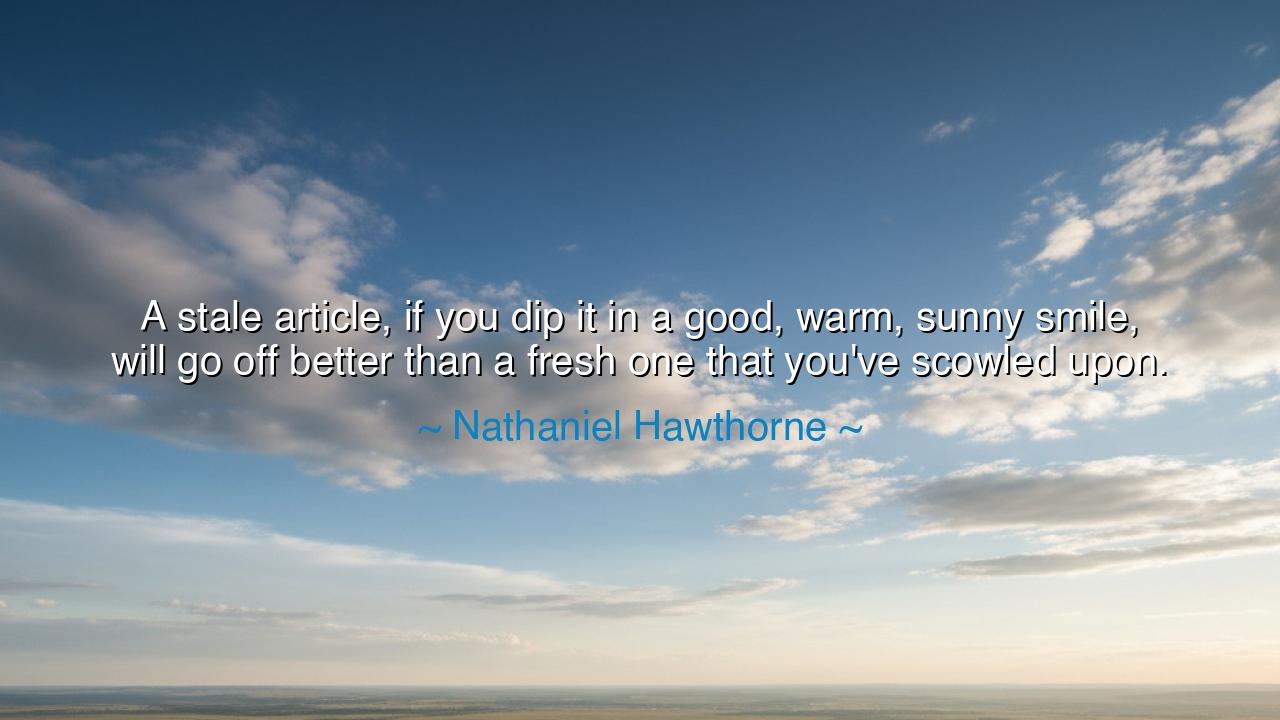
A stale article, if you dip it in a good, warm, sunny smile, will
A stale article, if you dip it in a good, warm, sunny smile, will go off better than a fresh one that you've scowled upon.






Hear the words of Nathaniel Hawthorne, the great weaver of tales, who once declared: “A stale article, if you dip it in a good, warm, sunny smile, will go off better than a fresh one that you’ve scowled upon.” At first, it may seem as though he speaks only of writing, of words placed upon a page. Yet the meaning runs deeper: he speaks of the spirit behind all human offerings. What matters is not only the gift, but the heart with which it is given.
The origin of this wisdom lies in the eternal truth that men and women respond not merely to substance, but to spirit. A loaf of bread handed with warmth feels more nourishing than a feast given with disdain. A humble garment, offered with joy, is worth more than a jewel bestowed in coldness. Hawthorne’s metaphor of the smile reveals that even the plainest work, even the most ordinary gift, becomes radiant when graced with kindness. Conversely, even brilliance can be dulled if presented with scorn.
The ancients knew this well. In Greece, the Sophists taught rhetoric and persuasion, but the wise Socrates showed that the way of speaking—the tone, the gentleness, the sincerity—often mattered more than the argument itself. In Rome, Cicero’s speeches moved crowds not only for their content but for the warmth of delivery. The smile, the light of goodwill in one’s bearing, could turn the dull into delight, while a scowl could sour even truth itself.
Consider history’s great example in Abraham Lincoln. Many of his speeches were plain, even simple in their language, yet they carried the weight of eternity because they were delivered with sincerity and gentleness. His face, often described as weary, shone with kindness when he spoke. Even when repeating old truths, his words were received with power because they were dipped, as Hawthorne would say, in a sunny smile. Contrast this with orators who, though eloquent, carried harshness in their tone, and whose words withered after being heard.
The deeper meaning is this: it is not only what you bring into the world, but how you bring it. A stale idea, an old story, a simple act—all can shine if offered with joy, with warmth, with goodwill. A scowl, on the other hand, can poison even the freshest work. Hawthorne calls us to remember that human beings crave not perfection, but connection. It is the smile that opens the heart, not the novelty of the offering.
This truth extends to every part of life. In the marketplace, a merchant’s greeting often sells more than his wares. In the home, a meal made with love is remembered long after the taste has faded. In friendship, a kind expression sustains bonds more than clever words. Everywhere, the smile proves to be the hidden spice that transforms the ordinary into something cherished.
Therefore, beloved, let this be your practice: whatever you offer to the world—be it work, words, or simple presence—dip it first in the warmth of a smile. Do not scorn what is plain or familiar, for it can carry greatness if delivered with joy. And do not pride yourself on freshness alone, for without kindness, even brilliance can fall flat. In this way, you honor Hawthorne’s wisdom: that a sunny smile can make the dull shine brighter than the new, and that the heart behind the gift is what lingers in the souls of those who receive it.






AAdministratorAdministrator
Welcome, honored guests. Please leave a comment, we will respond soon